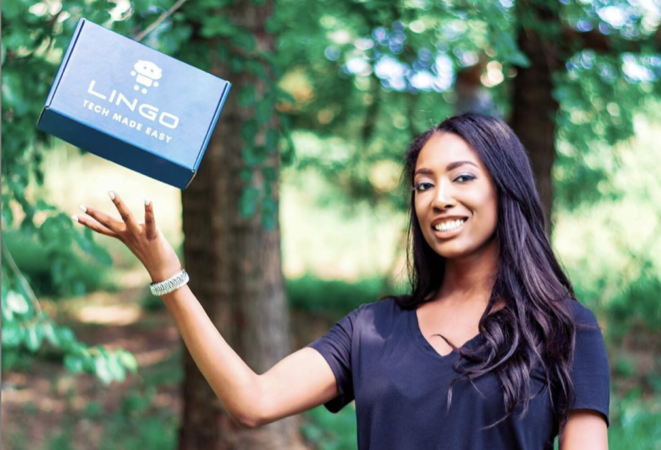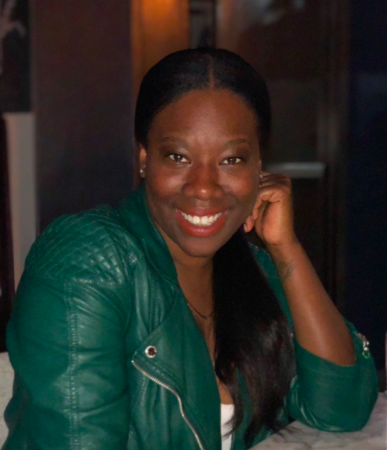The famous phrase “it’s not rocket science” doesn’t apply to Aisha Bowe, a Black female aerospace engineer and entrepreneur. A graduate of The Aerospace Engineering Program at the University of Michigan, Bowe earned her stripes at NASA having received the National Society of Black Engineers award for Outstanding Technical Contribution.
“I spent time in the government working for NASA as a rocket scientist, and I didn’t see people who looked like me,” she said. “I wanted to find a company that could demonstrate technical proficiency well by doing cool things.”
Motivated by a desire to increase Black representation in the tech space, Bowe founded STEMBoard, a tech company that creates smart systems and solutions for large scale U.S. federal and private sector clients. Some of the nation’s leading problems for high-priority organizations within the government — such as the Department of Defense — contracted her team of engineers to develop innovative solutions.
“I’m out to elevate the profile of what it means to be a Black woman in tech, to be a CEO, and to run a company in the hopes of inspiring more people to do the same thing,” she said. “Because when you have multi-million dollar companies, you can create more. We can make investments. We can provide that leadership and infrastructure, which is the ecosystem that our people need to grow and succeed.”
AfroTech: Seven years ago, you launched STEMBoard without venture capital. What was your motivation behind that decision?
Aisha Bowe: Before I was a company owner, I observed that sometimes nonprofits fall victim to funding priorities. There’s a lot of talk in Silicon Valley about investment and going after venture. Still, because I didn’t have money, I was forced to sharpen my service and the value that my organization would provide and find resources to make it happen. And if I know one thing about people of color and Black women, especially, we will make a way when there’s no way. For three years, I was able to identify government opportunities that were incentivized to help me build a team of people I trust.
There’s no half-stepping in this. You can’t be on a contract for the U.S. federal government in the area that I’m in and not be prepared. We were part of the Department of Defense’s Mentor-Protégé Program, which is three years of development, and we turned that into consulting for companies like Booz Allen. And they also partner with us on the investment in STEM.
AfroTech: So, how did the coding kit, Lingo, come about?
Aisha Bowe: Well, working the federal contracts allowed me to leverage my own dollars to do research and development to create Lingo. We now have universities, nonprofit organizations, and companies with high brand recognition using our kits. For instance, General Electric uses them at a camp in D.C. for Howard Middle School and McKinley Tech students. I mean, it’s crazy for me to look out and see how impactful this has been. I receive emails from students that say this is the first time they’ve been taught a STEM subject from somebody who looks like them.
When I think about it, I didn’t have a single Black female professor in my engineering career. Not one. And those who are doing the Lingo activity are being taught by Danielle Regis, our Head of Product. And not only is the representation for Black students, but also for non-minority students because it widens their understanding of who’s out there.
AfroTech: As a Black woman in tech, what obstacles have you faced?
Aisha Bowe: The greatest obstacle that I faced was my perception of self. I spent way too much time feeling as though I was half as good when I was twice as great. And so there’s something to us as a community overperforming as a way of justifying or validating that we deserve to be here. That needs to stop. It took me a long time to be able to say, ‘Yeah, I’m a rocket scientist.’ I spent several years early in my career feeling like I was an imposter and always trying to show up and show out. Once I stopped doing that and started believing in what I want to do, that’s when things began to take off for me. Every day I get up and I work on a company that I dreamed up, making seven figures. And every day, I redefine what that job means to me.
Many of us are afraid to say, ‘Hey, I got up today, and I won,’ and I need for that to stop because we have legions of other women out there who are looking for inspiration and who are looking for education and advice. If we don’t own our stories, if we don’t share that, how can we hope to inspire or inform the people on the come-up?
AfroTech: To build a brand, do you believe an entrepreneur needs allies in tech?
Aisha Bowe: Your network is your net worth. Too often, the conversation I feel goes to your network in the Black community, but because of my technical background, I was fortunate to have many powerful allies with entirely different backgrounds who have encouraged me along the way. When I went to the government, some high-ranking white men helped me learn everything that I needed to know to be successful. I had office hours on their calendars, and I didn’t recognize the importance of it. And when I went to make my transition into government contracting, it was one of these same individuals who said to me, ‘Hey, I know a woman who owns a company who you should meet,” and she became the mentor for three years for my company. So what I find is that we had these conversations about access and mentorship. It’s crucial to study the other side of the game and leverage their techniques and the strategies that they’ve used for decades to be successful. A lot of the partnerships that I have are not necessarily minority, but I am taking that information, and I’m putting it into the community.
AfroTech: Ultimately, what do you want for the Black community, especially related to the Black community in tech?
Aisha Bowe: I am out here to demonstrate to the Black community that technology is a career option for them. I also want to show that you don’t have to wait until you become 18-years-old to build a company and make a million dollars. Like, you know how upset I was when I realized that had I just had the confidence, I could have done this earlier? But I didn’t have that example. The best part of my platform is telling younger people how I did it, and I hope that they can do this ten years earlier than I did. I also want to make sure that we start to own conversations that are important to us.
Case in point: Many companies had to stand down their artificial intelligence and facial recognition software because the technology was biased. You have people’s lives that have been disrupted by false identification, and when you get down to it, why were there less diverse teams [working on this software]? It was a Black woman who broke all this error wide open. And as a result, the tech companies stood down and realized that we need to be on the design team. We need to be in these decision-making positions. But it starts with showing and creating a culture where we mentor and sponsor the next generation.


